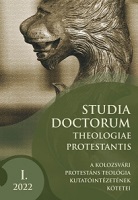Az abortusz kérdése a protestáns és római katolikus etikában
The Question of Abortion in Protestant and Roman Catholic Ethics
Author(s): Jónás Norbert FerencSubject(s): Christian Theology and Religion, Ethics / Practical Philosophy, Sociology, Family and social welfare, Biblical studies, Sociology of Religion
Published by: Kolozsvári Protestáns Teológiai Intézet
Keywords: abortion; Christian ethics; dignity of life; abortion and the Bible;
Summary/Abstract: Abortion is a topic that is gaining more and more attention today. It is present in the everyday life of Western cultures, whether we think of the ”pro-choice” or ”pro-life” movements, and more and more political parties have included the issue of legalising or even liberalising abortion in their campaigns. Public forums in the media often seek the views of both public figures and members of the public on the liberalisation and possible restriction of abortion. In the midst of the many opinions and political debates, the Church’s teaching and theological positions on abortion are negligible. It may seem that the weight of Church teaching has become marginal in the discussion of public issues in the postmodern society. In this paper I have explored the philosophical perspectives from which we refer to the topic of abortion today. I have focused on the concept of human dignity, following Marcus Tullius Cicero, René Descartes and Immanuel Kant, then I explored the theological definition of the concept of human dignity. At this point the difference between the Protestant and Roman Catholic theological understanding and exposition of the theological idea of the ”imago Dei” emerged. What is a strong common ground between the two theological perspectives on the dignity of human life is the definition of human life as a gift from God. All moral judgments must be made from this perspective. Then I examined the Scriptures that are commonly used as a reference against abortion in theological ethics. A partial exegetical analysis of the texts has shown that in most cases they cannot be accepted as direct statements. the Bible does not directly addresses the issue of abortion. For this reason, I have also sought out the works of theologians from whom these interpretations can be derived (Didache, Papianus’ letter, Tertullian: De Anima, Apologeticum, St Basil: De Baptismo, St Augustine: De Nuptiis et Concupiscentia, De Fide et Symbolo, De Civitate Dei). Last but not least, I have also examined the Reformers’ statements on apostasy. An important emphasis in the essay is the comparison of the Protestant and Roman Catholic positions. This comparison reveals that the two theological ethics take different positions on distinctive points, thanks to the different theological foundations and starting points that I discuss in the paper. I illustrate the comparison with the church statements, ethical statements and encyclicals that are still in force.
Journal: Studia Doctorum Theologiae Protestantis
- Issue Year: 13/2022
- Issue No: 1
- Page Range: 81-128
- Page Count: 48
- Language: Hungarian

